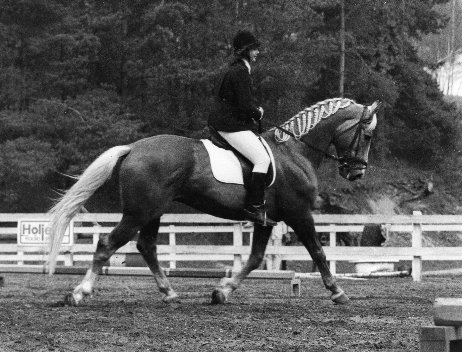Do You Have to Compete?
I saw a fantastic post by a colleague on the topic of competing or not competing, and I thought I’d add my own thoughts on the matter.
Since ancient times, it has been important for humans to show and prove that they are skilled and valuable. It’s no different in the animal world, where animals compete for the best mate to ensure their lineage continues and that their offspring are strong and capable of survival. This instinct goes deep into our genes and can be hard to ignore. Competing can also be very fun; it gives a purpose to training, a goal, and a way to measure how far you’ve come. However, sometimes competition can take over, and then the question arises: when is enough, enough?
Parents often try to raise their children with competition in their blood, aiming to be the best, to strive, to become someone. Unfortunately, I’ve been to pony competitions, for example, where I’ve had to leave because it was awful to watch. The child was expected to win at all costs, and it was 190 km/h around the course with the whip to the pony’s rear. That’s when someone exploits another being to reach their goal in the wrong way.
I have a little funny story I’d like to share, even though it’s not about horses, but it’s very much about how people think about competition.
We were on a skiing holiday many years ago, and our children were about 9 and 12 years old at the time. They hadn’t skied much before, but we found a good instructor who was very pedagogical and reassuring. My youngest son was very cautious and took his time, but he learned to slowly ski down the slope and navigate between the markers. After a few days, there was going to be a competition for the children, but it was cleverly designed so that the goal was not to come in first, but to do two runs and have the times be as close to each other as possible. My youngest son was a bit hesitant and didn’t think he was good enough, but I convinced him that he should just have fun and take it easy.
I stood at the bottom of the slope, watching and taking pictures. Next to me were two couples, loudly commenting on all the children skiing down. Their children were evidently experienced skiers, almost racing down the slope, and there were no limits to how talented their kids were. Then my oldest son came down, and no compliments came from these people. Next came my youngest son, and they commented that he really shouldn’t be allowed to participate, he was so bad, and there were many rude remarks about how slowly he skied. My children almost didn’t want to do the second run because they felt embarrassed, but I encouraged them, reminding them that it was good practice, it was all about having fun, and they shouldn’t listen to those people (who I actually called idiots). That evening, there was an award ceremony! Guess who won? My youngest son, who had skied calmly and steadily, in the same rhythm. In second place came my oldest son! When we walked back from the stage, where they had received their prizes, I passed by the table where the “idiots” were sitting. I couldn’t help but loudly talk about how great my kids were, and for some reason, those wonderful parents didn’t look very happy.
It’s not always that justice prevails (though I think it did in my story), and unfortunately, I’ve seen and heard similar situations at competitions. Parents shouting and arguing with judges, children crying, etc. It’s hard to hold competitions without feeling that you’re better than someone else. It’s easy to try to push your horse a little extra in the wrong way just to get those last few points.
It becomes especially unfair in dressage, for example, when a horse’s gaits are also judged. I’ve seen at many competitions that those who don’t have warmbloods, and therefore don’t have their type of movement, are judged down. I’ve spoken to many skilled dressage riders who have considered buying Spanish horses, for example, as they are easier to ride and more suited for certain movements, but they don’t dare to because they know that the judges won’t treat them fairly. So it’s not just about how the rider rides, but also how the horse moves.
So, how should you approach it if you want to compete? Go without expectations. See it as a journey with your horse and think of the judging as a guide to where you and your horse want to go. Treat the other competitors kindly, cheer them on, and talk about the ride with them. Maybe you’ll get tips on how to reach the next level. Remember, the others are nervous too, and they might not always show their best side 🙂 Be a friend, not a competitor. Be happy for your horse and think about all the things that went well and be glad for that 🙂
The picture is of me and my stallion Mackay at a dressage competition in the 1980s.


